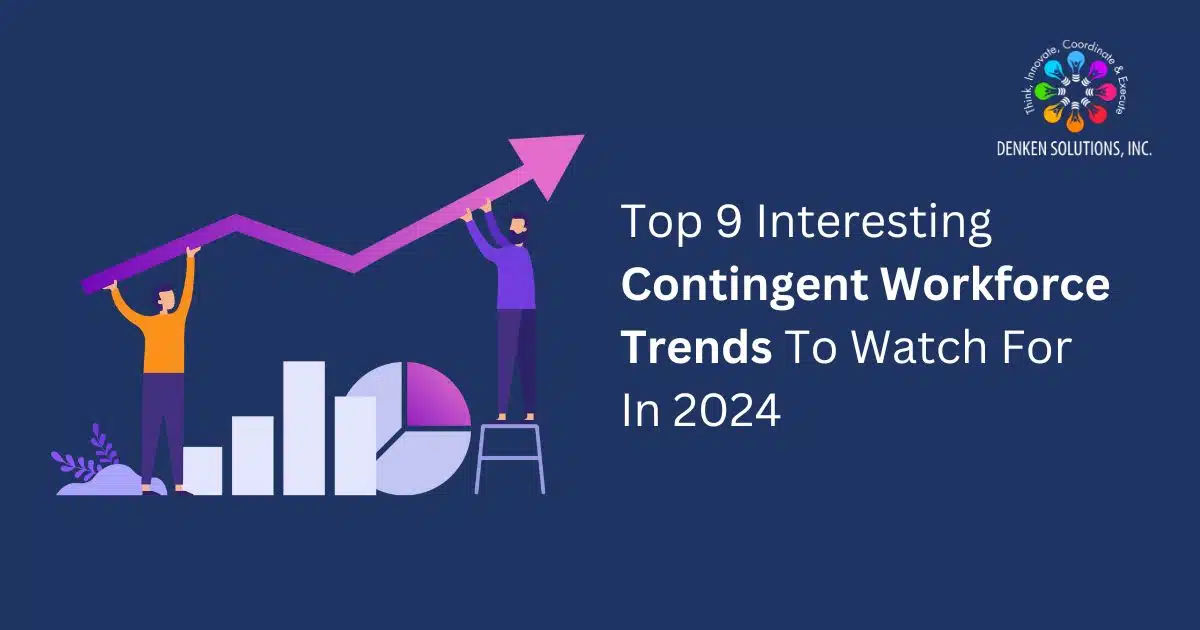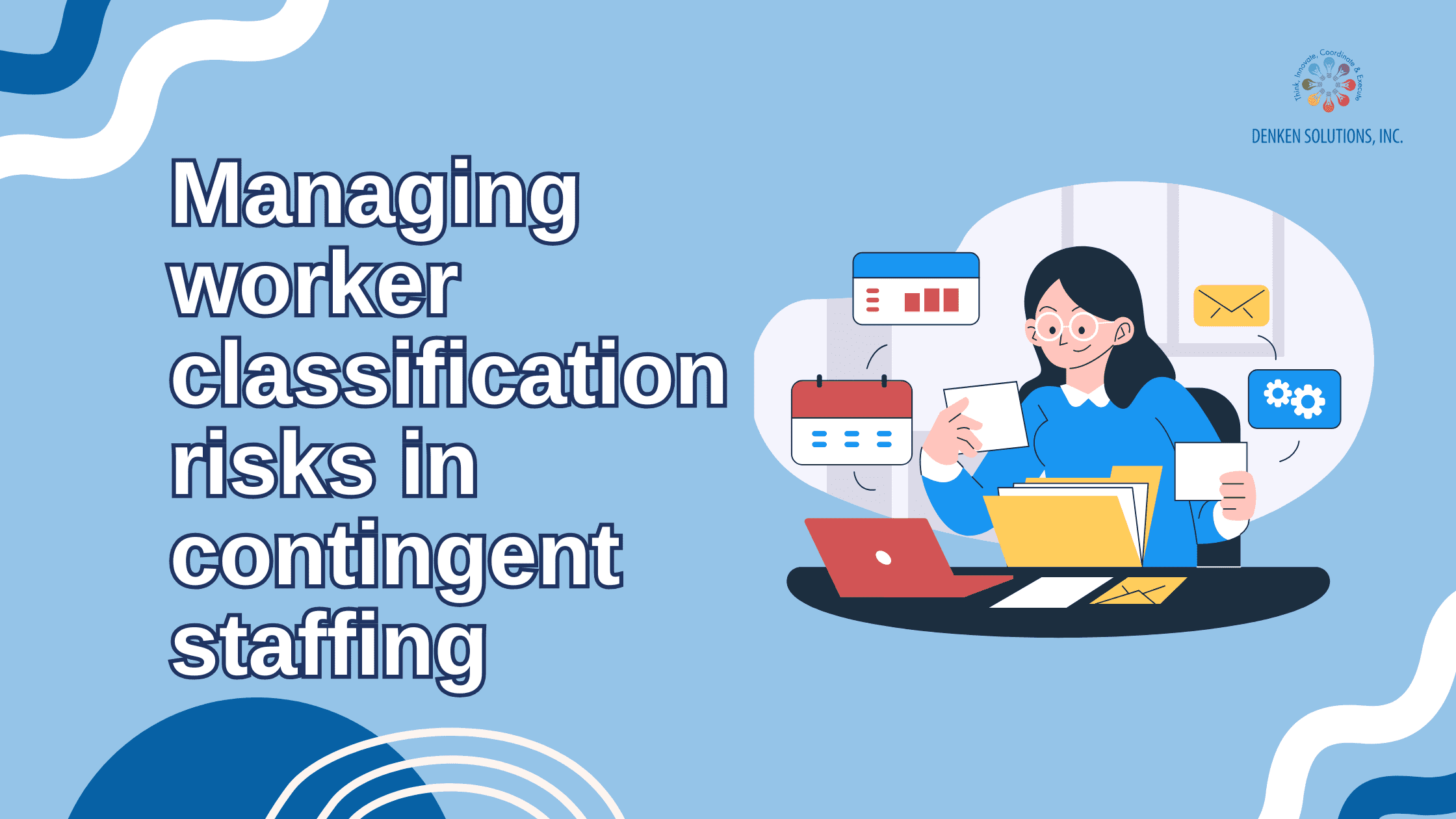Transforming Employment: Key Trends in the Contingent Workforce for 2025
The triple forces of technological innovations, economic fluctuations, and changing workforce demographics have brought a major alteration in the employment realm at present. Gig workers, freelancers, or seasonal workers who are hired on a temporary or contractual basis are referred to as contingent staff. The contingent workforce model has greatly evolved and changed ever since the outbreak of the COVID-19 pandemic.
Let’s discover the major contingent workforce trends shaping the contingent staffing model in 2025
Remote Work Norms
Prepped by the first wave of the pandemic, most companies have started embracing technological innovations, facilitating remote work norms, and engaging in virtual collaboration. This has brought about a major breakthrough in the traditional strategies and methods deployed for contingent workforce management, driving an increased need for staffing solutions services. The rising dependency on remote work offers companies an opportunity to outsource talent across the globe without bothering about geographical barriers or physical office space.
Remote work norms not only equip employers with versatile and diverse talent across the globe but also prove advantageous for employees. It acts as an intrinsic motivator for employees, offering them the desired flexibility, work-life balance, and reduced stress, leading to enhanced productivity. This is in line with current contingent labor trends, where flexibility and location independence have become key factors in attracting top talent.
Technological Advancements
In addition to making transformations in the way of working, the emergence of the latest technologies such as AI has digitalized and streamlined the contingent workforce hiring process, one of the main staffing KPIs in today’s market. The fusion of such innovative technologies with humanistic strategies helps companies in undertaking a balanced approach to talent acquisition and management.
With AI-powered insights and a data-driven recruitment process, it has become convenient for companies to attract and retain high-grade talent. This transposition of the hiring process towards a tech-oriented approach bridges companies with a wider talent pool. Notably, contingent workforce recruiting technology is playing an essential role in shaping how companies engage and hire skilled workers remotely, making it easier to source talent faster and more efficiently.
Expansion of Gig Economy
The significant rise in digital trends across all business sectors has paved the way for the gig economy and empowered companies with a better talent acquisition system, enabling them to create a strong contingent workforce. Structured with freelancers, contractual employees, and project-based workers, the contingent labor market has undergone massive changes over the past few years. With the gig economy attaining impulse, companies are increasingly utilizing these platforms to capture niche talent, scale their workforce, and adhere to the ever-changing market demands. The benefits of hiring contingent workers are now clear, giving companies greater flexibility and access to specialized expertise, which is aligned with the broader contingent workforce trends.
Skill-Specific Hiring
Another massive change observed in the hiring criteria for contingent workers is that employers are now increasingly focused on the specialized skills and competencies of candidates and not just educational background or experience. Unlike traditional recruitment practices, modern hiring follows a more profound approach to getting hold of proficient individuals possessing meticulous skills required to propel innovation, deal with complicated market challenges, and remain competitive.
Regulatory Changes and Compliance Challenges
With the rising complexities in the legislative world and new employment regulations coming into force all the time, companies are now investing more time and effort to adhere to compliance regulations. In addition to the need to maintain strong communication and collaboration with remote contingent staff, the diverse nature of the workers brings on an extra layer of complexity for employers, that is, contingent workforce compliance. Improper worker classification, poor employment standards, and lack of adherence to tax obligations can cause companies to encounter legal and financial consequences. Thus, companies ought to take a proactive approach while addressing regulatory changes and compliance challenges to keep up with the contingent workforce trend.
Diversity and Inclusion
Considering the present market scenario, the benefits of fostering diverse and inclusive workplace cultures are well-recognized by companies. To drive innovation, employers are now trying to grasp unique skills and capabilities by implementing diversity and inclusion initiatives in the hiring process. They are ensuring adequate opportunities for under-represented groups not only to attract top talent but also to enhance their employee retention strategy and elevate their brand awareness.
Enhanced Focus on Employer’s Brand Reputation
While companies are now aiming to fill skill gaps by developing a contingent workforce model, they have realized that the competition for the best talent has augmented. Candidates not only get moved by good salary packages but also look forward to getting associated with a company with strong brand values. Hence, to get hold of top talent, companies need to build a diverse workplace culture, develop and achieve sustainability goals, and implement strong brand values.
Continuous Learning Opportunities
With the introduction and adoption of the latest technologies in business operations, contingent workers often come up with the fear of job obsolescence if they do not get adequate learning opportunities. Thus, companies have now started investing in training and development initiatives such as online courses and project-based learning programs for contingent workers along with their in-house staff to ensure they are empowered to adapt to advancing technologies and required job competencies. Such initiatives improve the overall employee experience, thereby creating a positive impact on the brand’s reputation.
Mental Well-being and Work-Life Balance
Flexible work arrangements have not only helped employers to get hold of diverse and versatile talent across the globe but these have also proved to be advantageous for the employees. The remote work norms provide contingent workers the desired flexibility, helping them to create a boundary between personal and professional life. This further lowers their stress levels, enabling them to take on new tasks and challenges more regeneratively.
Conclusion
To conclude, emerging technologies, market changes, and shifting workforce preferences have increased the demand for flexible work arrangements. Remote work has become the new normal, while the rise in gig economy platforms has provided companies with the opportunity to scale their workforce faster and better.
By utilizing the best of technology along with human-centric approaches in the hiring process, companies make sure to reach the best talent for shaping their contingent workforce model. The hiring process has now become more streamlined, and employers are now more focused on employees’ skills and competencies. The importance of adhering to regulatory changes and contingent workforce compliance challenges is well-recognized in the face of the remote work landscape. In addition, employers have started initiating continuous learning opportunities for contingent workers, prioritizing their mental and emotional health and well-being, and fostering a diverse and inclusive workplace culture.
So, if you wish to future-proof your company and thrive in today’s competitive business world, form a partnership with Denken Solutions. We specialize in using a technology-driven approach to find and source the best talent for your business. With AI-powered insights and data-driven approaches, we develop future-ready staffing solutions services that give you access to the top contingent staff to drive your business forward. If you are looking to scale your workforce globally by hiring contingent workers with specialized skills or strengthen your onshore teams, Denken Solutions stands as your trusted partner in every aspect.
Sign up on our platform to learn more about our global staffing services and tailor them to your business needs. Let’s start a new journey together and uncover new opportunities for your growth and success.



